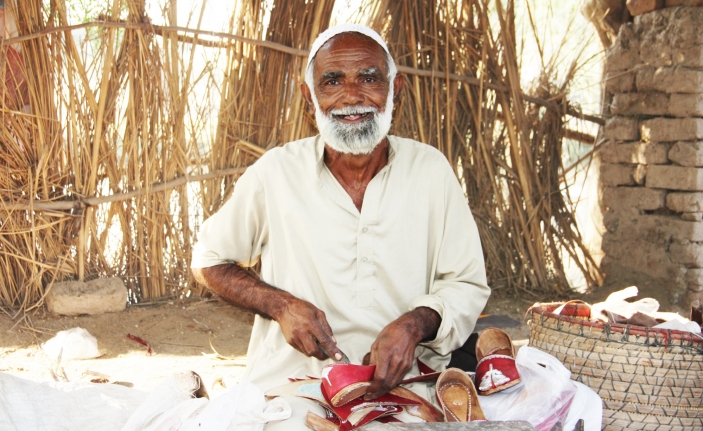
Many older men and women in Pakistan lead difficult lives, struggling to bring in a regular income and getting little financial support from the government. Only 6% of adult workers are covered by social protection, typically government workers. The rest have nothing.
Unless you’re a civil servant, you have no retirement age. There is no pension waiting for you, so you continue to work until you are physically unable.
Older people in rural areas of Pakistan typically earn a living through farming, or by running small businesses such as shops.
They have knowledge, skills and experience, but they are not able to get loans due to their age. This practice is discriminatory and can have a severe impact on their life and the lives of their family they support, particularly when a disaster strikes. However, our experience shows that investing in older people to help them build livelihoods has benefits for them, their families and the wider community.
The story of Abdul the cobbler
Abdul Hameed is a 65-year-old cobbler living in Basti Tuhafapur in Pakistan’s Punjab province. He is living with his wife and one of his six sons, who is unwell. Abdul has been making khussa shoes since he was 14, learning from his father who was famous for his cobbling skills.
Abdul works out of a small, temporary hut on a roadside corner, making his shoes using raw material he buys from Multan 60 km away.
When floods hit the area in 2014, Abdul’s village was also one of the worst affected. The flood water rose to four feet and caused severe damage. Abdul was unable to work for three months and spent all his savings recovering in the aftermath.
When he was ready to reopen his business, Abdul had no money to buy the raw materials, and those he already had were destroyed in the flood. But he still had to keep food on the table, so he began polishing shoes to bring money in.
If a customer asked for khussa shoes, he would take an advance and travel to Multan to buy the materials for that one pair. But this meant for every single order he had to travel the long distance, which was a physical strain and meant he could not save or make shoes very quickly. As a result, he started to lose customers.
How HelpAge supported Abdul to get his business going
HelpAge International, with the support of the German foreign office and HelpAge Deutschland, launched an emergency programme in Abdul’s district Muzaffargarh to support older people in the wake of the floods.
We distributed conditional cash grants for older people to use to rebuild their livelihoods. Abdul was one of the recipients, having been identified by the community support group in his village.
He took part in a livelihood training session, which was organised for all people receiving grants to teach them how to manage small enterprises.
Abdul Hammed received 30,000 Pakistani rupees (US$287) which he used to buy leather, threads, glue and other materials.
“Now I have enough material, customers have started visiting me again,” said Abdul.
“The transitional period was really tough. I used to make only 150 to 200 Pakistani rupees a day polishing shoes, which was not enough to cover my daily living expenses.
“I once had a dream to go on Ummrah [Islamic pilgrimage] with my wife, but never thought that I would be able to do it with a few hundred rupees in my pocket. After the revival of my business, I have already saved 35,000 Pakistani rupees and I am very much confident that soon my dream will come true.
“I am grateful to HelpAge for believing in the skills of an older man. It has not only helped me overcome life’s obstacles, but also provided me hope for the future.”
I believe the story of Abdul is a fantastic example of how an older person can make a comfortable living with a bit of support. It also demonstrates how the money he received was invested back into the local economy. It should provide excellent learning for government and microfinance institutions who can help older people help themselves and trigger wider benefits for communities!
Find out more about our work in Pakistan and donate now to help more older people like Abdul earn a regular income.
